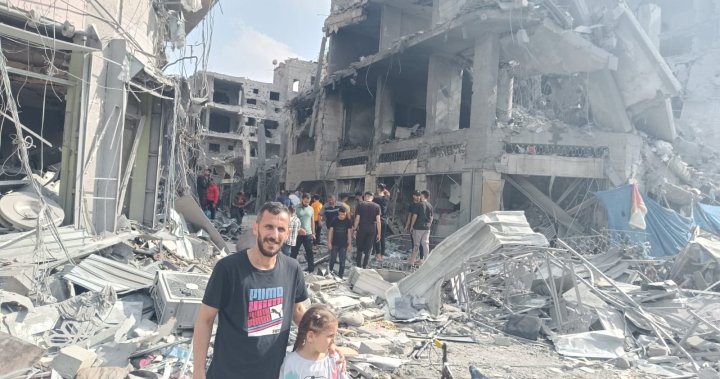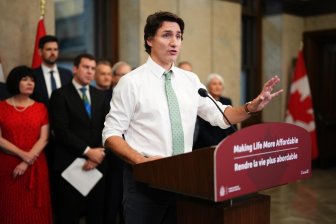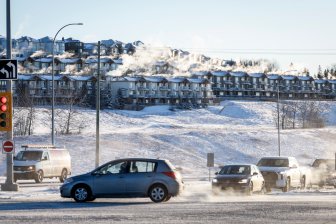Palestinian-Canadians and permanent residents are in a race against time to submit applications for Ottawa’s new program offering three-year visas for extended family members to take refuge in Canada.
Those who have completed the process are anxiously waiting to hear whether their relatives have been approved, with no guarantee whether they’ll be accepted or how long it could take to find out.
The federal government’s temporary resident pathway, which opened to applicants last week, initially promised to allow up to 1,000 people but an Immigration, Refugees and Citizenship Canada (IRCC) spokesperson told Global News, that is not a “hard cap.”
The program allotment will be flexible to adjust to the number of applicants and their ability to leave Gaza, the spokesperson said. Those applying are being encouraged to get their documents submitted as soon as possible.
“It is important to note that given the interest in the program, a completed Temporary Resident Visa (TRV) application should be submitted as quickly as possible, as the unique code provide to submit the TRV will not guarantee a space,” said a statement from IRCC to Global News.

Canadian permanent resident Zahra Jouda said she submitted applications for six of her relatives: her parents, two sisters, brother and grandmother. She’s fundraising to help cover the costs as she waits to hear whether they’ve been accepted, while seeking text message reassurances they’re still alive.
“The moment I receive a dot, I know that they’re fine, but they’re trying to get connected,” Jouda told Global News. “This money will be used to get them out (and) find a place for them in Egypt until they are able to arrive to Canada.”
Get the latest National news.
Sent to your email, every day.
The Hamilton, Ont., resident arrived in Canada last month after fleeing the conflict in Gaza. She said her family home, which they evacuated in the first few days of the conflict, has since been destroyed in an airstrike.
“What we need is a ceasefire. We need this to stop. We want to go back to our houses, even if they are bombed. We don’t want to leave Gaza,” Jouda said.

Jouda said she considers herself lucky, as others are still waiting for a unique code to be able to proceed with their applications.
Canadian permanent resident Abdallah Alhamadni shares a similar sentiment; he’s grateful for the chance to help his family and is also fundraising as he waits for confirmation about whether they have been accepted.
He’s submitted applications for 61 of his and his wife’s extended family members, nearly half of whom are children, including their newborn nephew.
“When I put on the hat of logic, this is an overwhelming number. It’s a big number. Then if I put on the hat of humanity, I say I can’t prioritize, I can’t take one and leave another — take one child and leave another child to die,” Alhamadni said.
But Alhamadni said the application process was challenging and confusing. Some immigration lawyers say an “unprecedented” level of information is being asked for on the applications.
“Parts of the present form, first of all, are open-ended, have no date range, and are asking for certain information like social media handles, past phone numbers, past email accounts, things like that,” said Pantea Jafari, an immigration lawyer and founder of Jafari Law, in an interview with Global News.
Jafari, who is an advisor to lawyers and community organizations assisting applicants, said the information being requested is above and beyond other security vetting processes for similar programs.
“The level of detail certainly is something I’ve never seen. I’ve been in the industry for some 15 years and I’ve never seen them ask for, for example, indication of your scars,” Jafari said.
She said applicants have been in panic and distress, trying to navigate the process of gathering such detailed information from relatives who are, in many cases, malnourished, traumatized, and without access to regular internet or cellular connections. Others may have lost critical documents in the conflict.
“The majority of people, I’m sure, are not going to be able to provide all of the information, the documents that are being required. Not requested, required. As a result, they will have to continuously be making requests for consideration and exemptions at every stage of the process,” Jafari said.
Ottawa said it’s part of a unique security screening process that takes into consideration the volatility on the ground in Gaza.

“As we did in Afghanistan, a multi-stage security screening approach has been developed. This is necessary as IRCC has no presence in Gaza and we are unable to collect biometrics. Under this approach, IRCC will collect enhanced biographic information so that initial admissibility screening can be conducted while clients are in Gaza, followed by full admissibility screening, utilizing biometrics, once clients arrive in Egypt,” IRCC said in a statement.
Getting out of Gaza is another challenge, something Jouda said she wishes wasn’t their only hope for survival.
“One hundred days now in Gaza since they’re under all of that, and we have been talking every single day and no one is listening. People are watching us die, watching us getting killed and slaughtered. And no one is doing anything,” Jouda said.




